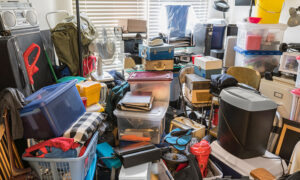It is not uncommon to find hoarders in HOAs. While the act of hoarding itself should not affect an HOA, it has an indirect impact on the community’s appeal to would-be homeowners. Most people keep their hoarded items inside the house, but when they get out of hand, they can easily spill over to yards, driveways, and sidewalks. This leads to a drop in curb appeal and, potentially, property values.
In this article:
Hoarders in HOAs: A Growing Problem
Hoarding is a behavioral disorder marked by an overwhelming accumulation of possessions, often leading to living spaces becoming cluttered and impractical. Individuals with hoarding tendencies commonly find it challenging to let go of items, regardless of their minimal or nonexistent value and may undergo significant distress when considering discarding possessions.
Estimates find that 2% to 6% of the population has a hoarding disorder. It affects both men and women, though it is more common among older adults than younger ones. That said, symptoms can manifest in as young as 11 to 15 years old.
In HOA communities, hoarding has become increasingly prevalent, causing a variety of problems. Association boards struggle to address the issue, as it’s difficult to find the right balance. While HOAs don’t have control over the items owners choose to keep, hoarding can become so excessive that it starts affecting neighbors and the community at large.
Is Hoarding Allowed in HOAs?
 Hoarding isn’t something that the law regulates. There are no laws, federal or state, that prohibit homeowners from hoarding. While HOAs can’t stop owners from buying and keeping items in their homes, some rules may touch on the issue. For instance, an HOA may not allow clutter or unnecessary items in yards, lawns, or driveways. An HOA may also require owners to keep their pathways clear.
Hoarding isn’t something that the law regulates. There are no laws, federal or state, that prohibit homeowners from hoarding. While HOAs can’t stop owners from buying and keeping items in their homes, some rules may touch on the issue. For instance, an HOA may not allow clutter or unnecessary items in yards, lawns, or driveways. An HOA may also require owners to keep their pathways clear.
There are several reasons why an HOA may want to prevent hoarding in the community. It comes with a number of risks, including but not limited to:
1. Fires
When a fire starts, it can spread more rapidly throughout homes and units littered with junk and clutter. Moreover, first responders may have a more difficult time dealing with the fire if too many things are blocking their way.
2. Pest Infestations
Hoarding gives way to pests, as the pockets and gaps are the perfect places for rodents and insects to breed. Due to the clutter, it’s also harder to locate these pests and get rid of them. Owners could live with pests for years before they start to notice something.
3. Mold
Clutter, especially moist clutter, can cause mold and mildew to grow. Mold and mildew have adverse health effects, can damage property, and even spread to other units through the walls or vents.
4. Foul Odor
Let’s face it — hoarders don’t keep their things organized. It’s the very definition of hoarding. They don’t make it a point to clean their junk every week. This, coupled with the potential for mold growth, can cause a foul stench to form and permeate.
5. Spillover
Left untreated, hoarding can worsen, and hoarders will soon run out of space within their homes or units. Before long, they might find space elsewhere, such as front lawns, driveways, sidewalks, hallways, and stairwells.
How to Get Rid of Hoarders in HOAs
 Before HOA boards make rash decisions, it’s essential to know that hoarders may be protected under the Fair Housing Act (FHA) as a recognized mental disorder or disability. Associations can’t deny or throw out homeowners simply because they are hoarders. Homeowners with hoarding disorders may also be eligible for reasonable accommodations under the FHA.
Before HOA boards make rash decisions, it’s essential to know that hoarders may be protected under the Fair Housing Act (FHA) as a recognized mental disorder or disability. Associations can’t deny or throw out homeowners simply because they are hoarders. Homeowners with hoarding disorders may also be eligible for reasonable accommodations under the FHA.
That said, boards are not entirely powerless regarding hoarders in HOAs. After all, an HOA may be liable if hoarders get too excessive and their behavior starts to affect others.
Here are the things an HOA can do to deal with hoarders in the neighborhood.
1. Determine the Level of Risk
First of all, boards should identify whether the hoarding issue has turned into a full-blown risk. If the hoarding behavior has not gotten out of hand, an HOA may be okay with taking no action for now. However, if the issue threatens the homeowner’s or others’ safety and health, an HOA should step in.
2. Communicate With the Hoarder
Stepping in does not equal aggressive action. Associations should begin with the least intrusive option before moving up the ladder. Boards should reach out to the hoarder first and seek to resolve the problem amicably.
Send a letter and offer assistance. While this likely won’t convince a clinical hoarder to stop or correct the issue, it’s still worth a shot. Boards might also consider contacting the owner’s family for help. Of course, if the hoarding has spiraled and resulted in broken rules, the HOA board should follow its violation process accordingly.
3. Offer Help With Cleanup
Sometimes, a nudge in the right direction is all someone needs. There is a difference between telling someone to clean up their mess and offering help. Boards should offer options or assistance with cleaning. Providing a list of specialized cleaning services is an excellent place to start. From there, the board can suggest counseling services to address the root cause of the hoarding.
4. Seek Third-Party Assistance
Taking the first few steps above shows an HOA’s compassion and openness to resolve the issue amicably. However, if they don’t work, referring the issue to the local Department of Health is a good idea. Some municipalities even offer specialized programs designed to educate and help hoarders.
5. Take Legal Action
Legal action should be an association’s last resort, as it is the most aggressive, expensive, and time-consuming option. It also won’t solve the underlying issue. Sometimes, though, it remains an HOA’s only option after exhausting all other efforts.
If an HOA can’t make any other reasonable accommodation or the hoarding behavior consistently puts the owner or others at risk, the board should seek legal counsel. It’s a tricky situation, as a court may side with the hoarder and find that the association has violated the FHA. Talking to a lawyer first is the best course of action. From there, the lawyer should be able to steer the HOA to the right path.
Utilize Your Governing Documents
More and more boards are amending their governing documents to address hoarders in HOAs. Amended provisions include giving the association the authority to investigate hoarding and take necessary action to address the issue before it snowballs. Of course, given the role of the FHA in the situation, boards should hire a lawyer to assist with the amendments. This will ensure the HOA remains in the clear, liability-wise.
Regulating Hoarders in HOAs
Clearly, when it comes to hoarders, no blanket or universal solution works for all HOAs. While HOAs must approach the topic sensitively, proactive measures involve communication, assistance, third-party involvement, and legal action if necessary.
Elite Management Services provides legal assistance, among other things, to HOAs and condominiums. Call us today at (855) 238-8488 or contact us online to request a proposal!
RELATED ARTICLES:
- How To Deal With Wild Animals In HOAs
- 13 Tips On How To Improve Curb Appeal In Your Community This Spring
- HOA Security Guards: Do Homeowners Pay For Them? How Do They Improve Security?







